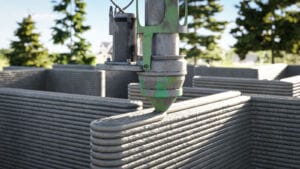Since 1953, the National Association of Women in Construction has been advocating for women in the construction industry and helping create a support network for those women in the field. Part of these efforts by the NAWIC is Women in Construction Week, which was started to highlight women as a vital part of the industry.
WIC week also helps raise awareness of the opportunities available for women in the industry and the shine a light on the growing impact that these women have in their communities.
WIC week falls on the first week each March.
As a continuation of WIC week, AZ Big Media is featuring stories that highlight some of the women working in the construction industry in the Phoenix market. The first of those stories is a Q&A with Skanska professionals Rochelle Riggs, an assistant project engineer, and Lacy Meadows, a project administrator.

Rochelle Riggs, Skanska Assistant Project Engineer
Q: What was it about a career in construction that appealed to you?
RR: I joined Skanska and the construction industry 23 years ago as a temporary field admin, filling in for someone who went on maternity leave. When that person decided not to come back, I knew I’d found a home with infinite opportunities for growth – one in which I could take pride in the company, the relationships that were established, and the product we produced.
Q: What’s the best advice that you were given during your career?
RR: We are primarily a relationship-based industry in which our success is in large part driven by the strength of the connections we create with owners, industry partners, subcontractors and our own internal colleagues. A mentor once told me, if someone comes to you with an issue, suggestion, or just to speak their mind, stop what you are doing and listen –listen with the intention of understanding rather than simply to respond.
Q: What is something unique you have learned or worked on since joining Skanska?
RR: I have had the opportunity to work in several different climates. It’s interesting to me that while construction components and methods are the same across the country, climate plays a key role in how teams approach projects. In an area where rain is an everyday occurrence, construction has adapted. In a drier climate, weather events such as heavy rain can be debilitating to the progress of a project.
Q: Would you recommend the construction industry to young women? If yes, why?
RR: The construction industry is rapidly changing from a male-dominated industry to one of strong diversity and inclusion. I would wholeheartedly recommend the construction industry to young women contemplating their career paths. There are countless opportunities and avenues to pursue within the fast-paced, ever-changing industry. It’s an industry that welcomes individuals who hunger for new opportunities, who want to capitalize their strengths, and who have a passion for building great things.
Q: Do you have a particular story that highlights the challenges of being a woman in a male-dominated industry like construction?
RR: The biggest obstacle I’ve come up against being female in a male-dominated industry is position stereotypes. Historically, in the construction industry, women have been in support roles, with no decision-making authority. That is changing, but the perception that a female is unqualified to provide direction still exists. I’ve found that a prompt, non-defensive, private conversation to call out the bias usually works to change the perception. Consistently speaking from a position of self-confidence and playing to your strengths also helps dispel the misconception.

Lacy Meadows, Skanska Project Administrator
Q: What was it about a career in construction that appealed to you?
LM: I started working in construction straight out of high school. I was working as a field secretary for a civil construction company. My dad has been in construction my whole life and we were blessed to have a great life. My dad was always so proud of all the roads he had built in the valley. When I was young anytime we would drive on a road that my dad had help build he would say “Can you feel how smooth this road is? It’s because I built it.” After working as a field secretary I went to work for a subcontractor. I learned a lot working for the subcontractor. I had the chance to come to work for Skanska Civil back in 2010. I came to work for Skanska building in 2016. I really enjoy watching a job from start to finish.
Q: What’s the best advice that you were given during your career?
LM: I’m generally a very quiet person and I tend to go with the flow. So the best advice that was given to me was speak up and be heard. It’s one thing to speak up and it’s another thing to be heard.
Q: What is something unique you have learned or worked on since joining Skanska?
LM: I’ve been on the same project since I started with Skanska in 2016. I’ve been on the Phoenix Sky Harbor T4N4 Concourse Renovations design-build. This job was unique because the space had to be fully operational the whole time we did the work. We renovated the Custom Border Protection space at Phoenix Sky Harbor. We had to do all of our work at night and in phases so we didn’t disturb the flow of passengers. Our superintendents worked the night shifts and the rest of the team worked during the day. We had to have really great communication within our team and our owners for the project to flow.
Q: Would you recommend the construction industry to young women? If yes, why?
LM: I would recommend the construction industry to young women. I have seen a lot of change in the industry and there is more and more acceptance of women in the industry. Construction is a fun industry to be in. When you are in operations there’s always something new to learn. There are so many different jobs within a construction company so there’s always room for growth and or change.
Q: Do you have a particular story that highlights the challenges of being a woman in a male-dominated industry like construction?
LM: I really don’t have a story of the challenges of being a woman in a male-dominated industry. Honestly I’ve been in a support staff job most of my career. I can say that the men on my current job have given me the confidence and courage to go after a different role.




